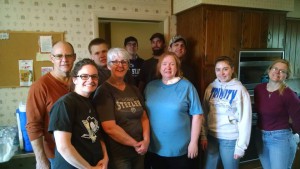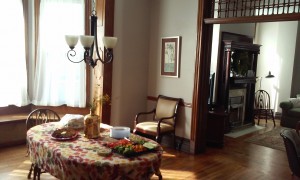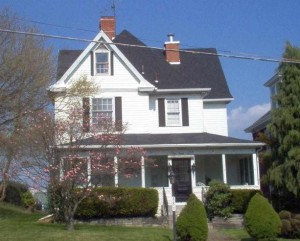
Volunteers are the backbone to the four recovery houses that are operated under the direction of Resurrection Power in Washington, PA.
No one is exempt from the issues of drug and alcohol abuse. Nearly everyone either knows someone who has struggled with this issue or has personally been under the grip of substance abuse. And the Rev. Bob Hedges is no different.
The former pastor at Windy Gap Presbyterian Church in West Finley, PA (Washington Presbytery) had daughters who struggled with drug and alcohol issues. He encouraged them by attending their support group meetings where the 12 steps of rehabilitation were reviewed, and it was at one of those meetings that he found out a little about himself.
“A guy who ended up being my sponsor encouraged me to take a look at myself rather than trying to fix my daughters,” Bob recalled. “He said I should look at my own issues how I use alcohol. I could see where I had some difficulties with alcohol.”
It was then at one of his own 12-step meetings that something else happened that affected him. A man walked into the meeting, whispered something to another guy and they both walked out of the room. Bob asked his sponsor what that was about, and the answer set a new course for his life.
“My sponsor told me that that was a drug dealer who came and took somebody out of the room,” Bob said. “The thought that popped in my head was that if drug dealers can come into the rooms and pull people out, where is the church in trying to work to help keep people to stay in? That was the germ of looking at some form of ministry to help support people who are in the recovery process.”
A short time later Bob and four other Presbyterian pastors from the Washington area who had a desire to work with those struggling with addiction gathered to discuss ways they can be helpful in this fight. A year later, Resurrection Power was born. Started at the beginning of 2001, Resurrection Power aims to walk alongside recovering addicts in the Washington, PA, area as they go through the 12 steps of recovery.
“Our mission is to carry the message of God’s love to those who are affected by substance use disorder,” said Bob, who had been a chaplain in a chemical dependency unit while he was in seminary in Louisville.
A three-year shared Mission Grant totaling $150,000 from the Synod of the Trinity, Washington Presbytery and the Presbyterian Church (U.S.A.) greatly assisted with Resurrection Powers’ startup costs. Following the year of planning by the five original Presbyterian pastor founders, Bob helped to provide pastoral care and started some small-group discussions and Bible studies for people who were in recovery.
“As we went along, we saw the tremendous need for people in recovery,” Bob explained. “They would go through a program or process of recovery, and then they would get their own housing through some government programs that were steering them toward independent living. As soon as they got their own house they were back into their addiction. So, we saw a need to provide a more stable living environment for people in recovery.”
Currently, Resurrection Power supports four recovery houses in the Washington area, each of which are home to 10 recuperating patients. Some other recovery houses may try to squeeze twice as many people into their structures, but Bob feels that can be counter-productive to the residents.
“These folks, as well as ourselves, we are precious to God, and God loves us,” Bob said. “We are valuable to him, we want to treat people with value and show them that they have worth in life, so we don’t crowd people in. We keep our places nice. Not luxurious, but nice. They don’t have to live in a crack house anymore; they can live in reasonable housing.”
The residents pay $350 per month for “program fees” to cover things like utilities and insurance, but the residents must supply their own food, clothing and personal soaps. Washington Presbytery and several churches in the community continue to help support things like administrative costs and will step up when big-ticket items like a roof or furnace need replaced.
“We provide a safe, structured, supportive and spiritually-focused environment for recovery,” explained Bob, who is currently the executive director of Resurrection Power. “We don’t try to duplicate other services that are in the community. We don’t do counseling or therapy in the house. What we do is provide a place where people can live, experience life and learn how to live without the use of drugs or alcohol in their life.
“They can go through difficult things like losing a job or losing a boyfriend or girlfriend or the loss of a loved one and still not return to their drinking or drugging as a way to cope. There’s also going through the joyous things of life together. It just takes time to experience life without the drugs and alcohol, learning how to do Thanksgiving or Christmas without relapsing.
“A lot of it is just providing a safe place, a supportive place and giving people time to develop their relationship with God and relationships with one another, and to continue to change, grow and heal.”
Residents, who can be referred to Resurrection Power by treatment centers or just show up through word-of-mouth, are able to stay in the recovery houses for as long as they need to, with some staying for multiple years. All of the guests need to have been involved in some kind of treatment and have stability in their lives.
“We don’t do detox with folks,” Bob said. “It keeps the house safe for the other folks who are already there. We’re not bringing somebody in the house who potentially is still using.
“People who come into our houses need to go to 90 12-step meetings in 90 days, get a sponsor and work steps. We do random urine tests. Part of the way in a community, we keep an eye on each other. We know what the addict behavior is. Sometimes people relapse, and that’s always hard.”
Local pastors regularly lead morning meditations and weekly spirituality groups that are all part of what goes on in these recovery houses, reminding the residents that they are important and that there is a light at the end of the tunnel.
“We operate out of our own experience, strength and hope,” Bob said. “We approach it from a Christian perspective so that we are, as our mission says, carrying the message of God’s love. We help folks come in who are looking for a spiritual solution to their problem. They are starting to re-establish their relationship with God from having dysfunctional images and understandings of God from childhood experiences and have ignored their spirituality for many years. We help them to explore who God is. God is very definitely behind everything that we do.”


